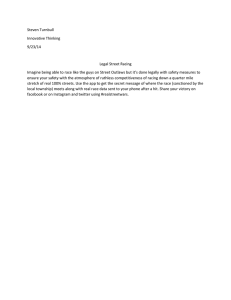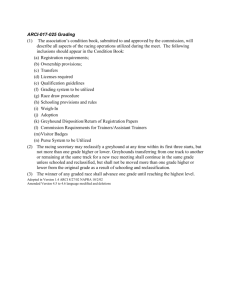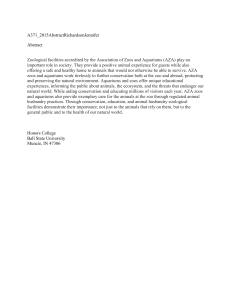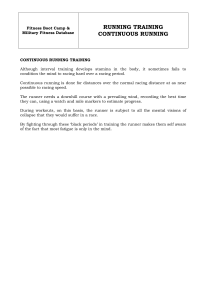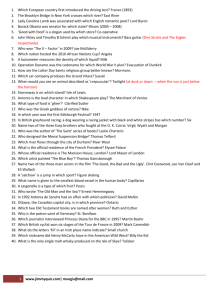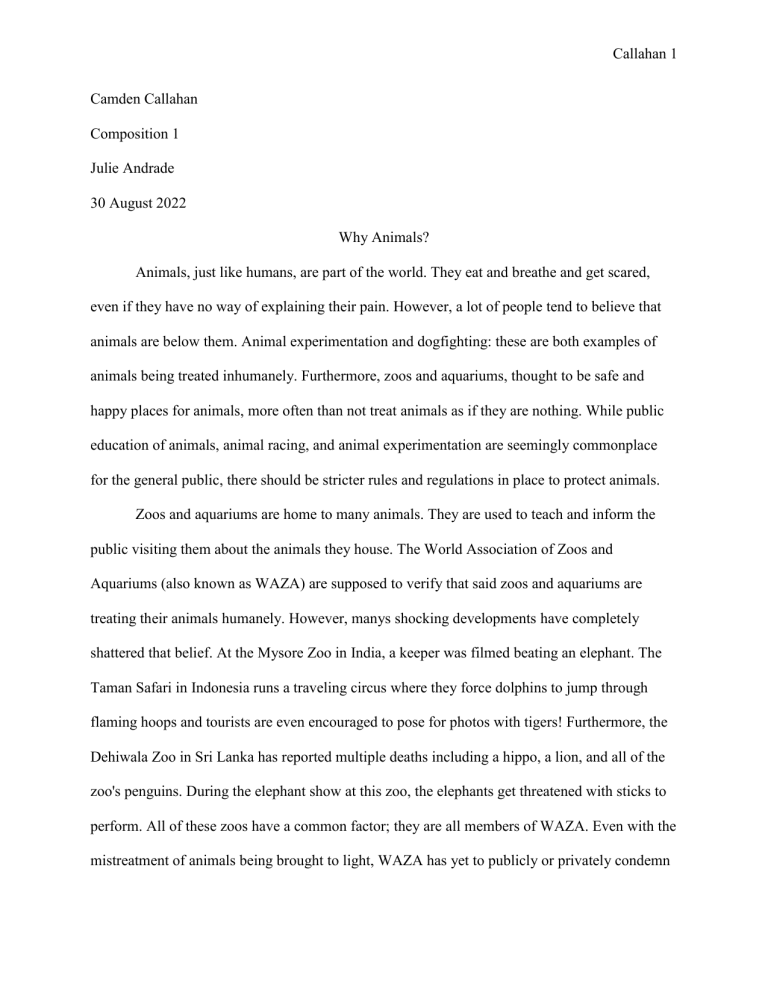
Callahan 1 Camden Callahan Composition 1 Julie Andrade 30 August 2022 Why Animals? Animals, just like humans, are part of the world. They eat and breathe and get scared, even if they have no way of explaining their pain. However, a lot of people tend to believe that animals are below them. Animal experimentation and dogfighting: these are both examples of animals being treated inhumanely. Furthermore, zoos and aquariums, thought to be safe and happy places for animals, more often than not treat animals as if they are nothing. While public education of animals, animal racing, and animal experimentation are seemingly commonplace for the general public, there should be stricter rules and regulations in place to protect animals. Zoos and aquariums are home to many animals. They are used to teach and inform the public visiting them about the animals they house. The World Association of Zoos and Aquariums (also known as WAZA) are supposed to verify that said zoos and aquariums are treating their animals humanely. However, manys shocking developments have completely shattered that belief. At the Mysore Zoo in India, a keeper was filmed beating an elephant. The Taman Safari in Indonesia runs a traveling circus where they force dolphins to jump through flaming hoops and tourists are even encouraged to pose for photos with tigers! Furthermore, the Dehiwala Zoo in Sri Lanka has reported multiple deaths including a hippo, a lion, and all of the zoo's penguins. During the elephant show at this zoo, the elephants get threatened with sticks to perform. All of these zoos have a common factor; they are all members of WAZA. Even with the mistreatment of animals being brought to light, WAZA has yet to publicly or privately condemn Callahan 2 or expel any members mistreating their animals (World’s Leading Zoo). SeaWorld, often criticized for their treatment of animals, is another example of inhumane treatment of animals. Orcas, also known as killer whales, are the most publicized animal of their treatment. They are taken from their pods and kept in isolation for the majority of their lives, only for the gain of a multimillion dollar company. Over the years a total of 37 orca whales have died prematurely at SeaWorld, and have died as young as 38 days old (Burgos). In the wild, these beasts could live to be 80 or 90 years old. Even the enclosures of these animals are unjust. While in the wild, orcas could dive up to 1,000 feet, but the enclosures they are kept in are just around 50 feet deep (World’s Leading Zoo). As much as the public is convinced they need zoos and aquariums to learn, there are much better ways than torturing defenseless animals. On the other side of the topic, one would argue that these animals do not deserve an opinion because they are not human. This is not even remotely humane or true. Another issue with animal rights is animal racing. Animal racing, and subsequent breeding, is rampant in America and Australia. The main illegal example being Greyhound racing, even though it is only illegal in 40 states (Greyhound Racing FAQ). Much like horse racing, Greyhound racing is part of the gambling industry. Before these dogs are even born, they are already being manipulated. People want the fastest dog while the ones who do not live up to expectations are usually euthanized. Those who are kept are housed in cramped cages. Racing dogs are normally kept in their cage for 20-23 hours a day, being refused the right to walk around or be with other dogs. According to the Humane Society of the United States, “At dog tracks nationwide, greyhounds routinely suffer serious injuries. From January 2008 through April 2018, a total of 15,273 greyhound injuries have been documented” (Greyhound Racing FAQ). At just two West Virginia racing tracks, over 8,000 greyhound injuries were reported. Of Callahan 3 those 8,000, 398 were deaths (Greyhound Racing FAQ). Owners of these animals often fail to meet basic health standards. Cases such as physical abuse, parasitic infestations, starvation, and failing to provide veterinary care are commonplace (Greyhound Racing FAQ). Although the treatment of the dogs during the time they are forced to race is terrible, the fate of the dogs after they can no longer race is just horrific. Some are put up for adoption or sent to breeding farms, however, the fate of many is unknown. One final example of animal cruelty is experimentation. Experimentation on animals is routine. The term “animal experimentation” is used to represent living animals put through scientific tests, usually for the convenience of humans. Animal testing in its most mild form can cause distress - mentally and physically - to animals, suffering, and death. The International Humane Society states, “Most animals are killed at the end of an experiment, but some may be reused in subsequent experiments.” Animal procedures can range from food and water deprivation to killing by carbon dioxide asphyxiation (Stone). An estimated 115 million animals are used worldwide for experimentation yearly. However, a mass amount of animals are excluded from that 115 million, including: purpose-bred rats, mice, birds, fish, and amphibians (Stone). In addition, animal testing does not give reliable real-world results. Creating human symptoms in animals does not mean the same disease is replicated, seeing as animals and humans can contract different diseases and react to the same diseases differently. The sacrifice of these animals is often for naught because the answers found do not work for humans. Many different animals go through different kinds of torture daily. Animals used for public education, racing, and experimentation are all for the ‘good’ of humans. These animals suffer for no reason, and the promised effects do not come to light. Animals deserve a better life than some are willing to provide for them. Callahan 4 Works Cited Burgos, Mara Liz Dias. “We Hunt, Capture, and Train Your Young for Entertainment Purposes.” FILOÉTICO, Filoetico, 27 Apr. 2015, filoetico.wordpress.com/2015/04/27/we-huntcapture-and-train-your-young-for-entertainment-purposes. Accessed 31 August. 2022. “Greyhound Racing FAQ.” The Humane Society of the United States, Humane Society, www.humanesociety.org/resources/greyhound-racing-faq. Accessed 2 Sept. 2022. Stone, Kristin. “About Animal Testing.” Humane Society International, 28 July 2022, www.hsi.org/news-media/about. Accessed 31 August. 2022. "World's leading zoo association overlooked horrific cruelty to animals; Zoos belonging to World Association of Zoos and Aquariums filmed allowing shocking mistreatment of elephants, dolphins, lions, bears, penguins and whales." Guardian [London, England], 24 Mar. 2015. Gale In Context: Opposing Viewpoints, link.gale.com/apps/doc/A406811661/OVIC?u=tel_a_nestcc&sid=bookmarkOVIC&xid=b70d3dce. Accessed 1 Sept. 2022.
